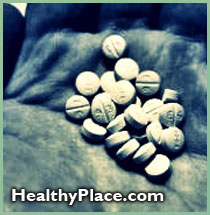Acute Phase of Bipolar Treatment
Medications used in treating an acute manic episode and acute depression associated with bipolar disorder.
Selecting a mood stabilizer for an acute manic episode
The first-line drugs for treating a manic episode during the acute phase are lithium and valproate. In choosing between these 2 medications, your doctor will consider your treatment history (whether either of these medicines has worked well for you in the past), the subtype of bipolar disorder you have (e.g., whether you have rapidcycling bipolar disorder), your current mood state (euphoric or mixed mania), and the particular side effects that you are most concerned about.
Lithium and divalproex are each good choices for "pure" mania (euphoric mood without symptoms of depression), while divalproex is preferred for mixed episodes or for patients who have rapid-cycling bipolar disorder. It is not unusual to combine lithium and divalproex to obtain the best possible response. If this combination is still not fully effective, a third mood stabilizer is sometimes added.
Carbamazepine is a good alternative medication after lithium and divalproex. Like divalproex, carbamazepine may be particularly effective in mixed episodes and in the rapid-cycling subtype. It can be easily combined with lithium, although it is more complicated to combine it with divalproex.
The newer anticonvulsants (lamotrigine, gabapentin, and topiramate) are often best reserved as back-up medications to add to firstline medications for mania, or to use instead of the first-line group if there have been difficult side effects.
How quickly do mood stabilizers work?
It can take a few weeks for a good response to occur with mood stabilizers. However, it is often helpful to combine mood stabilizers with other medications that provide immediate, short-term relief from the insomnia, anxiety, and agitation that often occur during a manic episode. The choices for so-called "adjunctive"medication include:
- antipsychotic medicines, especially if the person is also having psychotic symptoms (see above).
- a sedative called a benzodiazepine. Benzodiazpeines include lorazepam (Ativan), clonazepam (Klonopin), and others. They should be carefully supervised, or avoided, in patients who have a history of drug addiction or alcoholism.
Although both benzodiazepine sedatives and antipsychotic medicines can cause drowsiness, the dosages of these medications can generally be lowered as the person recovers from the acute episode. However, some individuals need to continue taking a sedative for a longer period to control certain symptoms such as insomnia or anxiety. Longer-term treatment with an antipsychotic is sometimes needed to prevent relapse.
Selecting an antidepressant for an acute depression
 Although a mood stabilizer alone may treat milder depression, an antidepressant is usually needed for more severe depression. It is dangerous to give antidepressants alone in bipolar disorder, because they can trigger an increase in cycling or cause the person's mood to "overshoot" and switch from depression to hypomania or mania. For this reason, antidepressants are always given in combination with a mood stabilizer in bipolar disorder.
Although a mood stabilizer alone may treat milder depression, an antidepressant is usually needed for more severe depression. It is dangerous to give antidepressants alone in bipolar disorder, because they can trigger an increase in cycling or cause the person's mood to "overshoot" and switch from depression to hypomania or mania. For this reason, antidepressants are always given in combination with a mood stabilizer in bipolar disorder.
Antidepressants usually take several weeks to show effects. Although the first antidepressant tried will work for the majority of patients, it is common for patients to go through 2 or 3 trials of antidepressants before finding one that is fully effective and doesn't cause troublesome side effects. While waiting for the antidepressant to work, it may be helpful to take a sedating medication to help relieve insomnia, anxiety, or agitation.
If depression persists despite use of an antidepressant with a mood stabilizer, adding lithium (if not already in use) or changing the mood stabilizer might help. Lamotrigine, in particular, may be helpful in depression.
Strategies to limit side effects
All of the medications that are used to treat bipolar disorder can produce bothersome side effects; there are also some serious but rare medical reactions. Just as different people have varying responses to different medications, the type of side effects different people develop can vary widely, and some people may not have any side effects at all. Also, if someone has problems with side effects on one medication, this does not mean that that person will develop troublesome side effects on another medication.
Certain strategies can help prevent or minimize side effects. For example, the doctor may want to start at a low dose and adjust the medication to higher doses very slowly. Although this may mean that you need to wait longer to see if the medication will help the symptoms, it does reduce the chances of side effects developing. In the case of lithium or divalproex, blood level monitoring is very important to insure that a patient is receiving enough medication to help, but not more than is necessary. If side effects do occur, the dosage can frequently be adjusted to eliminate the side effects or another medication can be added to help. It is important to discuss your concerns about side effects and any problems you may be experiencing with your doctor, so that he or she can take these into account in planning your treatment.
Sources:
- Post RM, Calabrese JR., Bipolar depression: the role of atypical antipsychotics, Expert Rev Neurother. 2004 Nov;4(6 Suppl 2):S27-33.
- Sachs, G. et al. (2007). "Effectiveness of Adjunctive Antidepressant Treatment for Bipolar Depression". New England Journal of Medicine 356 (17): 1711-1722.
- Muller-Oerlinghausen B, Retzow A, Henn FA, Giedke H, Walden J. Valproate as an adjunct to neuroleptic medication for the treatment of acute episodes of mania a prospective, randomized, double-blind, placebo-controlled, multicenter study. European Valproate Mania Study Group. J Clin Psychopharmacol 2000;20:195-203.
- Freeman TW, Clothier JL, Pazzaglia P, Lesem MD, Swann AC. A double-blind comparison of valproate and lithium in the treatment of acute mania. Am J Psychiatry 1992;149:108-11.
- Vasudev K, Goswami U, Kohli K. Carbamazepine and valproate monotherapy: feasibility, relative safety and efficacy, and therapeutic drug monitoring in mania disorder. Psychopharmacology (Berl) 2000;150:15-23.
next: Disastrous Medication Changes
~ bipolar disorder library
~ all bipolar disorder articles
APA Reference
Tracy, N.
(2008, October 31). Acute Phase of Bipolar Treatment, HealthyPlace. Retrieved
on 2025, April 28 from https://www.healthyplace.com/bipolar-disorder/articles/acute-phase-of-bipolar-treatment



